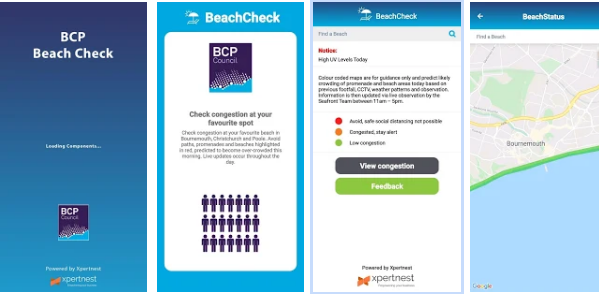
Photo: BCP Beach app Image: Google Play
English councils win funding for digital solutions to shared COVID-19 challenges
28 July 2020
by Sarah Wray
A group of councils in England will share £800,000 (US$1.29 million) in government funding for 11 projects which target common problems facing local authorities as they respond to coronavirus.
The initiatives include a tool to forecast crowding in the city, a predictive modelling system to evaluate possible impacts of the pandemic on vulnerable children, and data-sharing programmes.
The money comes from the Ministry of Housing, Communities and Local Government’s (MHCLG) Local Digital Fund.
A MHCLG statement said: “Councils have responded to the coronavirus pandemic by rapidly introducing innovative new ways of serving their communities. This new funding will help ensure they continue to modernise and improve the way they deliver public services.”
Local Digital C-19 Challenge
The projects were selected through the Local Digital C-19 Challenge, which opened for bids on July 1 to support data and digital projects, and received 125 applications from 94 council signatories within two weeks. The proposals are expected to deliver a product or outcome directly related to a COVID-19 challenge within two months, and outputs must be relevant to and reusable by other councils, as per the submission guidelines.
The following projects were awarded funding:
- Camden Council will receive £80,000 to make it easier for local people to have their say online on matters such as major planning projects and town centre changes. This follows changes to rules from May 14 which allow councils to publicise planning applications mainly on social media and other electronic means if they can’t do site notices, neighbour notifications or newspaper publicity. Camden will work with Middlesbrough Council.
- South Gloucestershire Council and the Royal Borough of Kingston upon Thames will jointly receive £80,000 to support increased online access to public meetings, citizens’ assemblies and statutory consultations. They will work with the councils in West Berkshire, Oxford, Staffordshire, Northamptonshire, Cambridgeshire, Waltham Forest and Milton Keynes.
- Leeds City Council will receive £79,500 to develop a guide to help councils better support residents who struggle with digital technology, especially those who are vulnerable or socially isolated. They will work with Croydon Council and Eastbourne Council.
- Greater Manchester Combined Authority will receive £80,000 to develop a predictive modelling system to understand and prepare for the possible knock-on effects of the coronavirus pandemic on vulnerable children.
- Newcastle City Council will receive £67,500 to develop a tool to help citizens understand which parts of a city may be overcrowded and therefore where it would be difficult to adhere to social distancing measures. Their work on data analysis could be used to help other councils predict overcrowding.
- Central Bedfordshire Council will receive £80,000 to build on data-sharing between councils and voluntary community services. The programme aims to give both groups better information about who needs support in their area and to share information quickly and securely to help more people. They will work with the Greater London Authority and Camden Council.
- A group of councils will receive £120,000 to speed up work to help councils identify vulnerable people so they can predict and give the right support. This merger of proposals will be worked on by Huntingdonshire District Council, Tameside Metropolitan Borough Council, Greater Manchester Combined Authority, North Yorkshire County Council, Bolton Council, Sedgemoor District Council and Somerset’s councils.
- East Riding of Yorkshire Council will receive £76,000 to build on what they’ve learned from changes to working practices during the coronavirus pandemic, including large-scale working from home and workplace adaptations to meet COVID-19 safety measures. This project aims to help to design future working patterns. They will work with North East Lincolnshire Council, North Lincolnshire Council and Hull City Council.
- Manchester City Council will receive £80,000 to learn from how council teams – across housing, social care, healthcare and more – have worked together to support vulnerable residents.
- Bolton Council will receive £23,000 to develop remote and self-service tools – such as sealed pods for face-to-face conversations – to help ensure people who can’t access council services online can still receive help.
- Bournemouth, Christchurch and Poole Council will receive £34,000 to help them add extra functionality to a smartphone app they have developed to prevent overcrowding on beaches, which has been an issue in the area during the pandemic.
The announcement comes two years since the launch of the Local Digital Declaration, a pledge signed by over 220 councils and public sector bodies which includes a commitment to share best practices with other councils and work collaboratively to expand benefits.
Local Government Minister Simon Clarke MP said: “Councils have made huge efforts to support their residents at this testing time – by housing rough sleepers quickly, supporting vulnerable people and ensuring services such as bin collections continue.
“They have had to adapt their services from in-person to online, using technology to do so and I am determined we capitalise on this and use everything we have learned to improve efficiency and make services better for residents and communities.
“That’s why we’re giving them £800,000 to build on the rapid digital innovation of recent months so that local communities continue to feel the benefits of more efficient public services.”
COVID-19 data-sharing
The UK government was recently criticised by public health leaders in England for not sharing enough detailed coronavirus data with local authorities. Last week, health secretary Matt Hancock said that “enhanced levels of data” will be provided to councils’ directors of public health, to help with locating and preventing potential future outbreaks. Earlier this month, councils in England were given new powers to close shops, cancel events and shut public spaces to manage local outbreaks.







